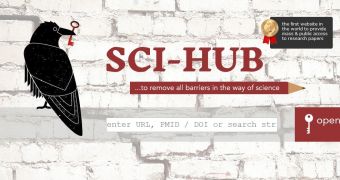Alexandra Elbakyan, a 27-year-old student from Kazakhstan, is operating the Web's largest portal for downloading scientific and academic papers, called Sci-Hub.
With a database of 50 million scholarly journals, the service is growing every day and has become the go-to hub for students and even university professors that have grown tired of paying hefty fees to read scientific papers, which in most cases have been funded from public funds and should be, in theory, free.
Elbakyan is already in legal trouble
In an exposé with the Washington Post, Elbakyan claims that she intends to keep the service running, at any cost, despite being sued in a New York court by Elsevier, one of the world’s largest academic journal publishers.
Elbakyan, who gave up legal representation, even after it was offered to her, only sent a letter to the judge, explaining how scientific journals work as a racket.
The problem, as she and other critics of the academic publishing model have expressed in the past, is that academia, in general, has started to glorify researchers who publish their papers only in a limited select group of scientific journals.
The operators of those journals leverage the fame to their advantage, and prior to publication, they request authors to sign over their copyright. This way, even if the research paper was publicly funded, for his own reputational gain, the researcher practically gives it away to a for-profit organization, which later asks for hefty fees for others to read.
The issue is so controversial that even the White House's Office of Science and Technology Policy has taken aim at fixing by mandating that publicly-funded research must become freely available to anyone within 12 months after its publication.
Sci-Hub is The Pirate Bay of scientific papers
While it may take time to fix the academic publishing model, Elbakyan's Sci-Hub database is growing every day, and even as she admits it, sometimes in not so legal methods.
According to Elbakyan, when someone searches for a research paper in her database, if the paper is not already available, the system will use preset login credentials for various university databases to search and download the paper into Sci-Hub's database.
As she explains, some of these access credentials were provided by inside sources that consider that information should be free, but she also doesn't rule out that some of the passwords may have been obtained from spear-phishing campaigns against the administrators of those accounts.
Either way, Sci-Hub is growing and academic journals will have to face the same type of fight the music industry has been losing ever since Napster first appeared on the scene.

 14 DAY TRIAL //
14 DAY TRIAL //